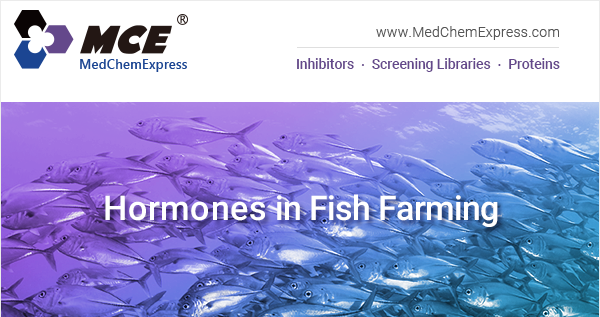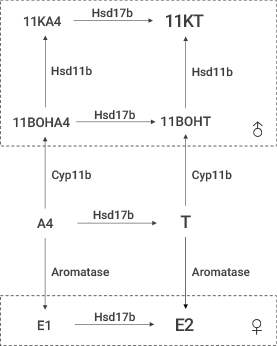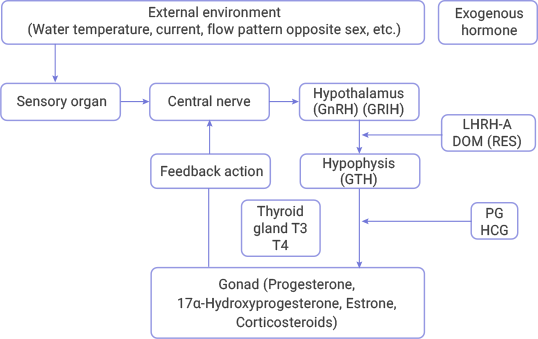|

|
|

|
|
Fish are beloved for their delicious taste, nutritional richness, high protein, low fat, and ease of digestion. To meet market demands, a measured use of hormones is employed in fish farming to enhance individual size and overall yield, while concurrently reducing the growth cycle.
|
|
|
Sex Reversal
|
|
Gender ratio control in fish farming is crucial, as selecting the predominant gender for cultivation aligns more effectively with market demands. Scientists have not only observed sexual dimorphism in fish, but robust gender plasticity, allowing the use of hormones for gender conversion and the subsequent establishment of monosexual populations[1]. The selection between male and female depends on whether a specific gender exhibits a faster growth rate. Compounds such as Estradiol valerate, Tamoxifen, Cortisol can be used for the cultivation of mono-female or mono-male populations[2].
|
|

|
|
Figure 1. Simplified illustration of steroidgenic pathways relevant to triggering
and maintaining sex change in teleost fishes[3].
|
|
Artificial Breeding
|
|
In addition to gender reversal, hormones play a crucial role in artificial breeding of fish fry. Human intervention with hormones can stimulate the maturation of fish gonads, either promoting or delaying the process. This manipulation serves to prolong the reproductive period of fish or regulate uniform spawning within more favorable timeframes. This not only allows businesses to control risks and save costs but also generate considerable economic returns[4]. Commonly used hormones include Reserpine, Pimozide, Domperidone, among others[5].
|
|

|
|
Figure 2. Illustration of regulation of gonadal development by nervous system and
endocrine system in fish[6].
|
|
Impact of Hormones on Human Health
|
|
Hormones used in fish farming are generally metabolized by the fish themselves and do not accumulate in fish flesh[7]. However, improper handling of aquaculture water after hormone use can lead to pollution. For instance, fish excreta and unconsumed hormone feed can result in secondary hormone intake, causing pollution[8]. Excessive intake of exogenous hormones can disrupt human endocrine systems, such as precocious puberty, breast development in boys, early bone maturation, and other adverse effects[9].
|
|
To ensure food safety, rigorous monitoring of residual hormones in both environmental and food samples is imperative. MedChemExpress (MCE) currently offers standards for the analysis of hormones to provide reliable data for your assessments.
|
|
MedChemExpress Products
|
|
MedChemExpress (MCE) is capable of offering a diverse range of reference standards encompassing active small molecules, natural products, lipids, isotopes, and more.
|
|
|
|
|
References: 
|
|
[1] American Scientist, 1984, 72 (2):128-136.
[2] Aquaculture, 232, 183-193.
[3] Reproduction. 2017 Dec;154(6):R149-R160.
[4] Journal of Food, 16:1, 679-691.
[5] Revista Brasileira De Reprodução Animal, 37(2), 174-180.
[6] Journal of Dalian Ocean University. 2020(01) Page:10-18.
[7] Aquaculture, 197, 229-281.
[8] Environment International, 28, 545-551.
[9] Environ Health Perspect. 2013 Apr;121(4):A104-6.
|
|
|
Global Partners
|
|

|
|
|
|

|
|
|
MCE USA
|
|
Tel: 609-228-6898
|
E-mail: sales@MedChemExpress.com
|
|
Address: 1 Deer Park Dr, Suite Q, Monmouth Junction, NJ 08852, USA
|
|
MCE China
|
|
Tel: +86-021-58955995
|
E-mail: sales@MedChemExpress.cn
|
|
Address: Building 3,1999 Zhangheng Road, Pudong New District, Shanghai
|
|
|
|
Products are for research use only and are not intended for human use. We do not sell to patients.
|
|
|
 ͏
͏ ͏
͏
